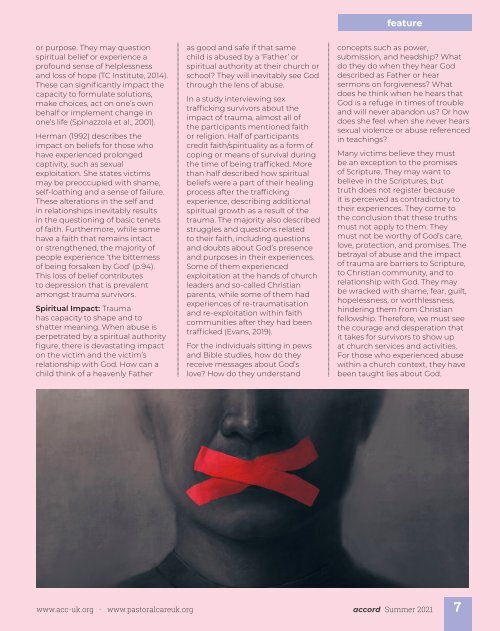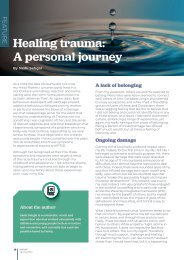ACC Accord Summer 2021 Issue 111
Create successful ePaper yourself
Turn your PDF publications into a flip-book with our unique Google optimized e-Paper software.
feature<br />
or purpose. They may question<br />
spiritual belief or experience a<br />
profound sense of helplessness<br />
and loss of hope (TC Institute, 2014).<br />
These can significantly impact the<br />
capacity to formulate solutions,<br />
make choices, act on one’s own<br />
behalf or implement change in<br />
one’s life (Spinazzola et al., 2001).<br />
Herman (1992) describes the<br />
impact on beliefs for those who<br />
have experienced prolonged<br />
captivity, such as sexual<br />
exploitation. She states victims<br />
may be preoccupied with shame,<br />
self-loathing and a sense of failure.<br />
These alterations in the self and<br />
in relationships inevitably results<br />
in the questioning of basic tenets<br />
of faith. Furthermore, while some<br />
have a faith that remains intact<br />
or strengthened, the majority of<br />
people experience ‘the bitterness<br />
of being forsaken by God’ (p.94).<br />
This loss of belief contributes<br />
to depression that is prevalent<br />
amongst trauma survivors.<br />
Spiritual Impact: Trauma<br />
has capacity to shape and to<br />
shatter meaning. When abuse is<br />
perpetrated by a spiritual authority<br />
figure, there is devastating impact<br />
on the victim and the victim’s<br />
relationship with God. How can a<br />
child think of a heavenly Father<br />
as good and safe if that same<br />
child is abused by a ‘Father’ or<br />
spiritual authority at their church or<br />
school? They will inevitably see God<br />
through the lens of abuse.<br />
In a study interviewing sex<br />
trafficking survivors about the<br />
impact of trauma, almost all of<br />
the participants mentioned faith<br />
or religion. Half of participants<br />
credit faith/spirituality as a form of<br />
coping or means of survival during<br />
the time of being trafficked. More<br />
than half described how spiritual<br />
beliefs were a part of their healing<br />
process after the trafficking<br />
experience, describing additional<br />
spiritual growth as a result of the<br />
trauma. The majority also described<br />
struggles and questions related<br />
to their faith, including questions<br />
and doubts about God’s presence<br />
and purposes in their experiences.<br />
Some of them experienced<br />
exploitation at the hands of church<br />
leaders and so-called Christian<br />
parents, while some of them had<br />
experiences of re-traumatisation<br />
and re-exploitation within faith<br />
communities after they had been<br />
trafficked (Evans, 2019).<br />
For the individuals sitting in pews<br />
and Bible studies, how do they<br />
receive messages about God’s<br />
love? How do they understand<br />
concepts such as power,<br />
submission, and headship? What<br />
do they do when they hear God<br />
described as Father or hear<br />
sermons on forgiveness? What<br />
does he think when he hears that<br />
God is a refuge in times of trouble<br />
and will never abandon us? Or how<br />
does she feel when she never hears<br />
sexual violence or abuse referenced<br />
in teachings?<br />
Many victims believe they must<br />
be an exception to the promises<br />
of Scripture. They may want to<br />
believe in the Scriptures, but<br />
truth does not register because<br />
it is perceived as contradictory to<br />
their experiences. They come to<br />
the conclusion that these truths<br />
must not apply to them. They<br />
must not be worthy of God’s care,<br />
love, protection, and promises. The<br />
betrayal of abuse and the impact<br />
of trauma are barriers to Scripture,<br />
to Christian community, and to<br />
relationship with God. They may<br />
be wracked with shame, fear, guilt,<br />
hopelessness, or worthlessness,<br />
hindering them from Christian<br />
fellowship. Therefore, we must see<br />
the courage and desperation that<br />
it takes for survivors to show up<br />
at church services and activities.<br />
For those who experienced abuse<br />
within a church context, they have<br />
been taught lies about God.<br />
www.acc-uk.org • www.pastoralcareuk.org accord <strong>Summer</strong> <strong>2021</strong><br />
7



